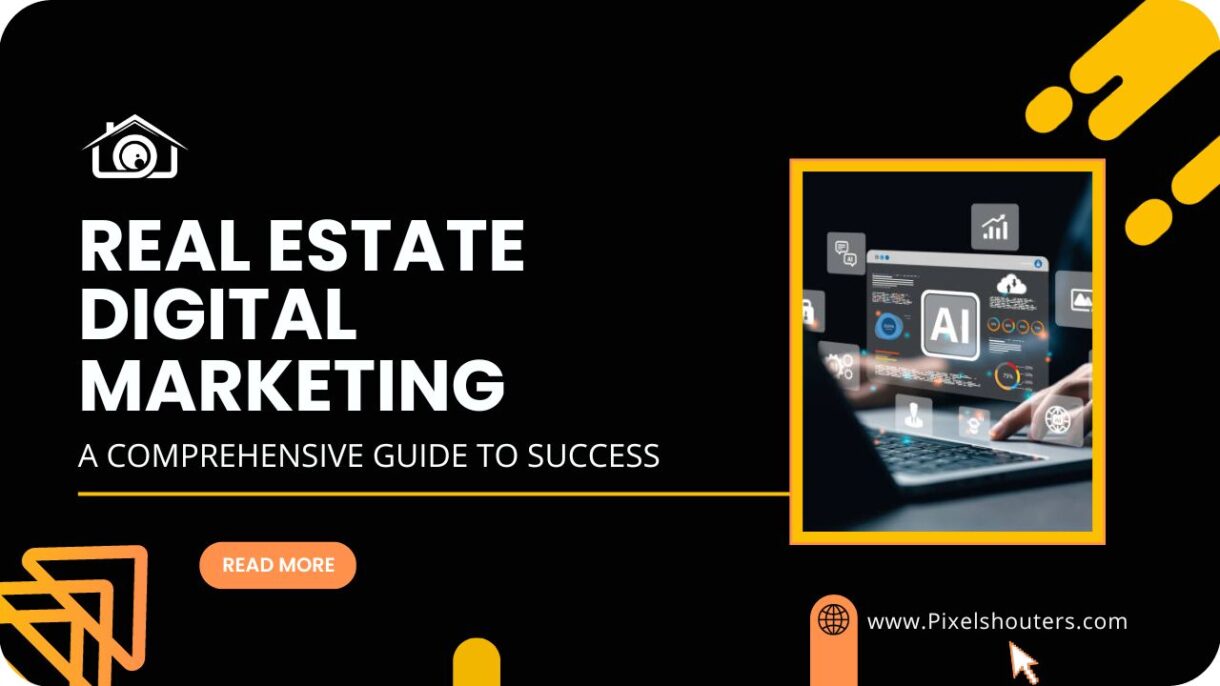Real Estate Digital Marketing: A Comprehensive Guide to Success
In trendy speedy-paced international, real estate experts have to embrace digital advertising to thrive in a aggressive marketplace. Whether you’re a seasoned real estate agent or simply starting your career, understanding the ins and outs of real estate digital marketing is vital. In this complete guide, we can discover the important strategies and techniques that assist you to increase your real estate enterprise through digital marketing.
Real Estate Digital Marketing Quick list
Defining the Objectives: Breaking the Cycle
The foundation of any successful digital advertising campaign is putting clean targets. This preliminary step is critical for breaking the cycle of useless marketing techniques that many real estate professionals locate themselves trapped in. To start:
Understand Your Goals
Before delving into the digital realm, it’s vital to outline your objectives. Do you want to increase property income, benefit greater leads, or build a stronger online presence? Knowing your dreams is the first step in growing a targeted digital advertising and marketing method.
In a competitive market, having properly-described goals is the key to standing out. Goals can encompass a huge range of effects, from growing your logo visibility to boosting property income. Consider the following targets:
- Boosting Property Sales: If your primary purpose is to growth belongings sales, your digital marketing and marketing strategies should cognizance on achieving capacity shoppers, showcasing houses successfully, and last offers.
- Lead Generation: For some real estate experts, the number one goal is to generate leads. This includes attracting capability customers and sellers for your website or different virtual channels and shooting their contact facts.
- Building Brand Awareness: If you’re trying to set up yourself as a trusted brand for your marketplace, your targets may revolve round constructing logo awareness. This can involve showcasing your understanding, sharing treasured insights, and highlighting your unique selling points
- Engaging with Your Audience: Effective engagement is another crucial objective. Engaging with your audience through social media, email, and other digital channels can help you build relationships, answer questions, and provide valuable information.
Metrics Matter
Measuring the success of your digital marketing efforts is key to refining your approach. Metrics like website traffic, lead conversion rates, and social media engagement will help you evaluate the effectiveness of your strategies and make adjustments as needed.
When defining your objectives, it’s essential to establish specific and measurable goals. This way, you can track your progress and make data-driven decisions to improve your digital marketing efforts. Some commonly used metrics for real estate digital marketing include:

- Website Traffic: Analyzing the number of visitors to your website provides insights into the effectiveness of your online presence.
- Lead Conversion Rate: Measuring how many leads you convert into clients or buyers is a critical metric. This helps you understand the efficiency of your lead nurturing strategies.
- Social Media Engagement: Tracking likes, comments, shares, and other forms of engagement on your social media posts can help you gauge the level of interest from your audience.
- Email Open and Click-Through Rates: In email marketing, open rates (the percentage of recipients who open your email) and click-through rates (the percentage who click on links within your email) Offer a glimpse into the efficiency of your email marketing efforts.
- Property Views: For real estate professionals, monitoring the number of views your property listings receive is a vital metric. It helps you understand the level of interest in your listings.
Identifying Your Target Audience
In real estate, understanding your target audience is paramount. A one-size-fits-all approach rarely works, so segmenting your audience is vital.
Defining Buyer Personas
Develop in-depth buyer personas that accurately portray your perfect clients. Take into account elements like age, income, geographic location, and lifestyle. Tailoring your marketing strategies to these personas will yield better results.
Understanding your target audience is a fundamental aspect of digital marketing success in the real estate industry. By creating detailed buyer personas, you can develop content and campaigns that resonate with your ideal clients. Here’s how to create effective buyer personas:
– Demographic Information: Start by collecting demographic information about your target audience. This includes age, gender, income, marital status, and more. These details help you understand who your potential clients are.
– Geographic Data: Geographic location is crucial in real estate. Identify the areas your potential buyers are interested in and focus your marketing efforts on those regions.
– Psychographics: Understand the lifestyle, preferences, and behavior of your target audience. What are their interests, hobbies, and values? This information helps you create content and messaging that resonates.
– Buyer Journey: Consider where your potential clients are in their buyer journey. Are they first-time homebuyers, experienced investors, or looking to sell their properties? This information helps you tailor your messaging to their specific needs.
– Challenges and Pain Points: Identify the challenges and pain points your potential clients face in the real estate process. This allows you to provide solutions and position yourself as a valuable resource.
Creating detailed buyer personas requires research and analysis. You can start by reviewing your existing client data, conducting surveys, and analyzing industry trends. The more accurate and detailed your buyer personas, the more effective your marketing efforts will be.
The Power of Personalization
Personalized marketing is more effective. By addressing the unique needs and preferences of your target audience, you can build stronger connections and trust, ultimately leading to higher conversion rates.
In a digital marketing landscape saturated with generic messages, personalization is the key to standing out and building strong client relationships. Here’s how personalization can benefit your real estate marketing efforts:
- Increased Engagement: Personalized content is more engaging. When your audience feels that your messages are tailored to their specific needs, they are more likely to interact with your brand.
- Higher Conversion Rates: Personalization has the potential to substantially increase conversion rates. By delivering content and offers that resonate with your audience’s needs, you increase the likelihood of them taking action, whether it’s contacting you, scheduling a showing, or signing a contract.
- Enhanced Trust and Loyalty: Building trust with potential clients is essential in the real estate industry. Personalized interactions, such as addressing clients by name and providing relevant information, help establish trust and foster client loyalty.
- Improved Client Retention: Personalization is not limited to attracting new clients. It’s also crucial for retaining existing clients. By continually providing personalized value, you can keep clients coming back and referring others.
Personalization Strategies
Implementing personalization in your digital marketing efforts involves various strategies:
- Segmentation: Segment your email list, social media followers, and website visitors based on factors like location, interests, and behavior. Tailor your content to each segment’s unique needs.
- Dynamic Content: Utilize dynamic content that adapts according to the recipient’s preferences and actions. For example, you can show different property listings to visitors based on their location.
- Personalized Email Campaigns: Craft personalized email campaigns that address recipients by name and offer content and promotions tailored to their interests.
- Behavior-Based Recommendations: On your website or in your emails, provide recommendations based on the user’s behavior. For example, suggest similar properties to the ones they’ve viewed.
- Custom Landing Pages: Create custom landing pages for specific marketing campaigns. This ensures that the content on the page aligns with the messaging of your campaign.
By adopting these personalization strategies, you can create more meaningful interactions with your target audience and achieve better results from your digital marketing efforts.
Choosing the Right Platforms
The digital marketing landscape offers numerous platforms, each with its own strengths and purposes. Selecting the right ones for your real estate business can make a substantial difference.
The choice of digital marketing platforms can significantly impact the success of your real estate marketing efforts. It’s essential to understand the strengths and purposes of different platforms to make informed decisions. Let’s explore some of the most prominent digital marketing platforms for real estate professionals:
Social Media Dominance
Social media platforms perform a critical role in real estate marketing. They provide a platform to showcase properties, engage with your audience, and build your brand.
With billions of users worldwide, Facebook is a powerhouse for real estate marketing. Create a business page and use it to showcase your property listings, share informative content, and run targeted ad campaigns.
Instagram’s visual nature makes it an ideal platform for showcasing property photos and videos. Use Instagram to engage with a younger, visually-oriented audience.

LinkedIn is valuable for real estate professionals, especially for connecting with potential commercial real estate clients, investors, and industry professionals. Share industry insights and network with your peers.
YouTube
Video content is incredibly effective in real estate marketing. Create property tours, agent profiles, and informative videos to engage your audience on YouTube.
Pinterest is a visual discovery platform. Use it to share property photos, home improvement ideas, and local area highlights.
Twitter is a great platform for real-time updates, sharing industry news, and engaging with your audience. Use it to stay in touch with clients and followers.
Social Media Advertising
Consider running targeted social media ad campaigns to reach specific demographics and interests. Social media ads can be an effective way to promote your listings and engage with potential clients.
Each social media platform has its unique strengths and demographics. To optimize your social media endeavors, prioritize platforms where your target audience is most engaged. Keep your branding consistent across all platforms and maintain an active and engaging presence.
Website and Blogging
Your website acts as the online storefront for your real estate enterprise. In addition to listing properties, consider starting a blog. Blogging about local real estate trends, home-buying tips, and community highlights can establish your expertise and attract visitors.
Professional Design
Invest in a professional website design that reflects the high standards of your real estate business. A clean, modern design with intuitive navigation is key.
Property Listings
Ensure your property listings are up-to-date, accurate, and well-organized. Include high-quality images, detailed descriptions, and any unique selling points.
Contact Information
Make it easy for visitors to contact you. Include multiple contact options, such as phone, email, and contact forms. Consider implementing live chat for real-time assistance.
Email Marketing
Email marketing continues to be a potent method for nurturing leads and maintaining connections with clients. Craft informative newsletters and target them to specific audience segments for maximum impact.
Segmenting Your Email List
Segment your email list based on various factors, including lead source, behavior, and interests. This allows you to deliver highly targeted content and offers to different segments.
Automation and Drip Campaigns
Use email automation to streamline your communication. Set up drip campaigns to deliver a series of emails over time, providing valuable information and nudging leads closer to conversion.
Personalization
Personalize your email content as much as possible. Address recipients by name, and use their past interactions and behaviors to tailor the content you send.
A/B Testing
Continuously improve your email campaigns by running A/B tests. Experiment with various subject lines, email content, and calls to action to pinpoint what engages your audience most effectively.
Email marketing is an excellent way to keep your audience informed, nurture leads, and stay top-of-mind. By using segmentation, automation, and personalization, you can significantly improve the effectiveness of your email campaigns.
Effective Content Strategies for Real Estate
High-quality content is the heart of digital marketing in the real estate industry. Your audience seeks engaging and informative content that helps them make informed decisions.
Visual Storytelling
Visual content is king in the real estate world. High-quality photos and videos of properties are essential. Consider virtual tours and 3D walkthroughs for an immersive experience.
High-Quality Property Photos
Invest in professional photography for your property listings. High-quality photos make a significant difference in capturing the essence and appeal of a property.
Virtual Tours and 3D Walkthroughs
Virtual tours and 3D walkthroughs provide an immersive experience for potential buyers. They can explore properties as if they were there in person, even from the comfort of their homes.
Drone Photography
Aerial photos and videos captured by drones can offer unique perspectives of properties, especially for larger estates or those with impressive landscapes.
Video Marketing
Video is a powerful tool for engaging your audience. Create property videos, agent profiles, and informative video content to showcase your expertise.
Informative Blog Posts
Publish blog posts that provide valuable information to your audience. Topics like “Top Tips for First-Time Homebuyers” or “Understanding Mortgage Rates” can position you as a trusted advisor.
Local Area Highlights
Highlight the communities and neighborhoods you serve. Share information about local schools, parks, shopping, and other amenities that potential buyers may find appealing.
Real Estate Trends and Insights
Stay updated with the latest real estate trends and share your insights with your audience. This demonstrates your expertise and positions you as an industry leader.
Home Improvement and Staging Tips
Offer practical advice on home improvement and staging. Tips on enhancing curb appeal, organizing spaces, and making cost-effective improvements can be valuable to sellers and buyers.
Client Success Stories
Share success stories of clients you’ve helped find their dream homes or sell their properties. Real-life examples can inspire confidence and trust in your services.
By offering a variety of informative and engaging content, you can capture the interest of your audience and provide them with valuable insights. Effective content strategies not only showcase your expertise but also nurture your leads through the buying or selling process.
6 Digital Marketing Tactics for Real Estate Agents
Here, we’ll explore six specific digital marketing strategies tailored to the real estate industry to boost sales and leads.
Craft a User-Friendly Website
Your website is the digital face of your real estate business. It should be user-friendly, visually appealing, and informative.
Professional Design
Invest in a professional website design that reflects the high standards of your real estate business. A clean, modern design with intuitive navigation is key.
Property Listings
Ensure your property listings are up-to-date, accurate, and well-organized. Include high-quality images, detailed descriptions, and any unique selling points.
Contact Information
Make it easy for visitors to contact you. Include multiple contact options, such as phone, email, and contact forms. Consider implementing live chat for real-time assistance.
Mobile Optimization
Optimize your website for mobile devices. A significant portion of users access websites via smartphones and tablets, so your site must be responsive and easy to navigate on smaller screens.
Loading Speed
Website loading speed is crucial. Slow-loading pages can deter visitors. Optimize your images and use fast hosting to ensure speedy page loads.
Security
Ensure your website is secure, especially if you collect sensitive client information. Implement SSL encryption and maintain regular security updates.
Master Real Estate SEO
Search engine optimization (SEO) is essential for improving your website’s visibility on search engines like Google.
Keyword Research
Identify relevant keywords that potential clients might use in their property searches. Include these keywords strategically in your website content.
Local SEO
Optimize your website for local searches. This is especially important for attracting clients looking for properties in specific geographic areas.
Quality Backlinks
Build high-quality backlinks to your website from reputable sources. This can improve your website’s authority and search engine ranking.
On-Page SEO
Optimize your website’s pages for SEO. This includes using meta titles and descriptions, header tags, and structured data to help search engines understand your content.
Mobile-Friendly Design
Ensure your website is mobile-friendly, as Google gives preference to mobile-responsive websites in its search rankings.
Content Quality
Produce high-quality, informative content that resonates with your audience. Google rewards websites that provide valuable information.
User Experience
Provide an excellent user experience on your website. Fast loading times, easy navigation, and a well-structured layout are important.
Embrace Google Ads for Quick Gains
Google Ads, formerly known as Google AdWords, is a powerful tool for real estate agents to gain quick visibility online.
Targeted Ad Campaigns
Create targeted ad campaigns that focus on specific property types, locations, or buyer demographics. This helps you reach potential clients interested in your listings.
Ad Budget Management
Set a clear budget for your Google Ads campaigns. Monitor the performance of your ads and adjust your budget allocation to maximize results.
Keyword Research
Conduct thorough keyword research to identify the most relevant keywords for your ad campaigns. This helps ensure that your ads appear to users searching for properties and real estate services.
Ad Copywriting
Write compelling ad copy that highlights the unique selling points of your properties and services. Use persuasive language to encourage clicks and conversions.
Landing Pages
Design dedicated landing pages for your ad campaigns. These pages should provide a seamless experience for users who click on your ads and include clear calls to action.
Ad Extensions
Use ad extensions to provide additional information in your ads, such as links to specific property listings, your contact information, and reviews.
Analytics and Testing
Regularly analyze the performance of your Google Ads campaigns. Test different ad variations and keywords to identify what works best for your audience.
Remarketing
Implement remarketing campaigns to re-engage users who have previously visited your website or interacted with your ads. This can help convert users who were initially undecided.
By strategically using Google Ads, you can target your audience effectively and generate quick results. Whether you’re promoting specific property listings or your real estate services, Google Ads offers a powerful platform for increasing your online visibility.
Implement an Email Marketing Campaign
Email marketing is a valuable tool for staying in touch with leads and past clients. Implementing a well-planned email marketing campaign can yield impressive results.
Segment Your Email List
Segment your email list based on factors such as lead source, interests, and where leads are in the buying cycle. This allows for more personalized and relevant email content.
Drip Campaigns
Set up automated email drip campaigns to nurture leads over time. These campaigns can provide valuable information, showcase properties, and encourage engagement.
Personalization
Personalize your email content to address recipients by name and provide content that aligns with their preferences and interests.
A/B Testing
Conduct A/B testing to determine which email subject lines, content, and calls to action resonate most effectively with your audience.
Timing and Frequency
Determine the best timing and frequency for your email campaigns. Consider the preferences and behaviors of your audience when deciding when to send emails.
Analytics and Reporting
Regularly analyze the performance of your email campaigns. Track metrics such as open rates, click-through rates, and conversion rates to assess effectiveness.
Email marketing is a valuable channel for maintaining ongoing communication with leads and clients. By segmenting your list, providing personalized content, and utilizing automation, you can maximize the impact of your email campaigns.
Virtual Reality (VR) Property Tours
Virtual reality property tours are an innovative way to engage potential buyers. By offering virtual tours of properties, you can provide a unique and immersive experience.
3D Tours
Invest in 3D virtual tours that allow potential buyers to explore properties from the comfort of their own homes. This technology can help reduce unnecessary physical showings.
Interactive Elements
Enhance virtual tours with interactive elements, such as clickable hotspots that provide additional information about specific features of the property.
VR Headsets
Consider providing VR headsets to potential buyers, allowing them to experience virtual property tours in a more immersive way.

Professional Photography and Videography
Ensure that the virtual tours are created using professional photography and videography to showcase properties in the best possible light.
Accessibility
Ensure that your virtual property tours are accessible across a range of devices, including smartphones, tablets, and desktop computers.
Virtual reality property tours offer a cutting-edge approach to property marketing. By providing potential buyers with an immersive experience, you can save time, attract more serious buyers, and stand out in a competitive market.
Embrace Real Estate Marketing AI Tools
Artificial intelligence (AI) is transforming the real estate industry. By embracing AI tools, you can streamline your operations and offer enhanced services.
Chatbots
Implement AI-powered chatbots on your website to provide immediate responses to common questions and capture lead information.
Predictive Analytics
Use AI-driven predictive analytics to identify potential buyers and sellers, enabling you to target your marketing efforts more effectively.
Data Analysis
Leverage AI tools to analyze data from your website, social media, and email campaigns. This data-driven approach helps you make informed marketing decisions.
Personalized Recommendations
AI can provide personalized property recommendations to potential buyers based on their preferences and behavior.
Lead Scoring
Use AI algorithms to score and prioritize leads. This helps you focus your efforts on leads that are most likely to convert.
Final Thoughts
In conclusion, real estate digital marketing is an ever-evolving landscape that offers countless opportunities for growth and success. By defining clear objectives, understanding your target audience, choosing the right platforms, and implementing effective content strategies, you can set the foundation for a strong digital presence.
Additionally, by mastering essential strategies such as crafting a user-friendly website, optimizing for SEO, using Google Ads, and embracing email marketing, you can significantly increase your chances of success in the real estate market.
Virtual reality property tours and AI tools provide innovative ways to stand out in the industry and deliver exceptional value to your clients.
In this digital age, it’s not enough to rely solely on traditional marketing methods. Real estate agents who adapt to the digital landscape will find themselves better equipped to navigate the challenges and opportunities of the modern market.
Remember that the key to successful real estate digital marketing is continuous learning and adaptation. Stay up-to-date with industry trends, monitor your digital marketing performance, and be ready to adjust your strategies as needed to ensure long-term success in the competitive real estate market.
XI. Additional Resources
Explore the following resources to further your understanding of real estate digital marketing:

[…] visually appealing but also user-friendly, providing visitors with a seamless experience. Embrace digital marketing strategies for real estate such as content marketing, social media advertising, and search engine optimization to expand your […]